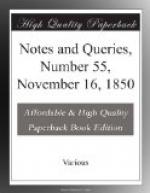The statement that the crook of the bishop’s staff was bent outwards, and that of the abbot’s inward, is one which is often made in books; I should, however, be very glad to learn whether any difference has been observed to exist either in mediaeval representations of croziers on seals, accompanying, effigies, or in paintings, or in the existing examples. So far as I have seen, the crook, in all except a few early instances, is bent in the same manner, i.e. inwards.
N.
Socinian Boast (Vol. ii., p. 375.).—The following lines “De Ruina Babylonis” occur in the works of a Socinian writer, one Samuelis Przipcovius, who died in 1670, and evidently have reference to those quoted by Dr. Pusey:— {413}
“Quid per Luterum, Calvinum, perque
Socinum,
Funditus eversam jam Babylona
putas?
Perstat adhuc Babylon, et toto
regnat in orbe
Sub vario primum nomine robur
habens.
Ostentat muros, jactat sublimia
tecta
De fundamento quis
metus esse potest?
Ni Deus hanc igitur molem disjecerit ipse
Humano nunquam Marte vel arte
ruet.”
Przipcovius was a Polish knight, and cotempory the author of Hudibras. In a tract entitled Religio Vindicata a Calumniis Atheismi, he thus alludes to the spiritual Quixotism which induced Butler to “crack the satiric thong:”
“Saepe audivi quod in Anglia (quae regio sicut in multis aliis rebus, sic praecipue in religionibus totius mundi compendium est) de ejusmodi fanaticis perhibetur, quod ita sui suarumque irrationabilium opinionum sint amantes, ut audeant propter eas divinam Providentiam angustis Ecclesiarum suarum (quae ex angustis cujuslibet Penatibus constant) terminis circumscribere.... Et quemadmodum omnes isti miseri aperte delirant, praecipue ii quos zeli aestus eousque deducit, ut tanquam bacchantes aut cerriti per plateas, domos, templa, absque ullo ordine et respectu cursitantes concionentur, et interdum anseres, equos, vel oves (cujus rei ibi satis frequentia exempla occurrunt) dum eis homines aures praebere nolunt, ad suas opiniones convertere tentent.”
R. PRICE.
Cheam.
MSS. of Locke (Vol. i., pp. 401. 462.).—In reply to a question in “NOTES AND QUERIES,” I may state, that the address of the son of the late Dr. Hancock, is George H., Park Grove, Birkenhead; and he will furnish information relative to the MSS. of Locke.
AN INTENDED READER.
Sir William Grant (Vol. ii., p. 397.).—Your correspondent R. says that “Sir William Grant” was one of the few Scotchmen who had freed himself from the peculiarities of the speech of his country. Frank Horner is another.” If R. means to include the Scottish accent, he is mistaken as to Sir William Grant, who retained a strong Scottish burr. If he means only correctness of diction, then I should say the number was not few. Mackintosh’s and Jeffery’s English was, I think, quite as pure as Horner’s; and Lord Brougham, with much idiosyncrasy, had no Scotch peculiarities, at least—me judice—infinitely less than Sir William Grant. I could name twenty members of the present houses of parliament in whom I have never detected any “Scotch peculiarity.”




